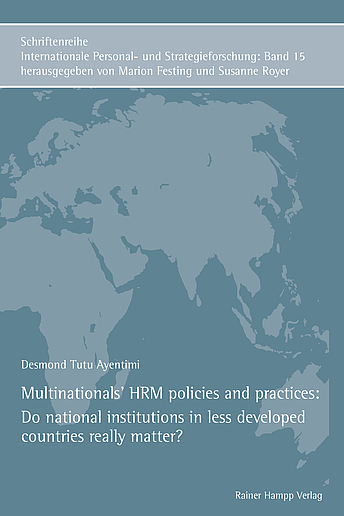Ayentimi
Multinationals’ HRM policies and practices
ISBN 978-3-95710-206-5
englischInstitutional theory claims that organizations interested in gaining legitimacy might have to adapt to the regulatory, cognitive and normative practices that reflect a host-country institutional environment. This book presents a study that draws on the theoretical lens of new institutionalism perspective to explore how the coercive (regulatory), cognitive (culture) and normative institutional settings of a less developed host-country impact MNE subsidiaries’ HRM practice configurations as well as HRM practice transfer. The study found constraints within the host-country educational and training arrangements, delays with the operation of the legal system, labour market constraints, cultural barriers as well as economic instability and political actors’ intrusion as institutional drivers influencing MNE subsidiaries’ HRM polices and practice configurations. This study adds to MNEs’ HRM practice transfer debate by highlighting the significance of the cognitive and normative institutional settings in LDCs as host-country institutional impediments to MNEs’ HRM practice diffusion and acknowledges greater flexibility within the regulatory system as a source of receptiveness for MNEs’ HRM practice diffusion.
Institutional theory claims that organizations interested in gaining legitimacy might have to adapt to the regulatory, cognitive and normative practices that reflect a host-country institutional environment. This book presents a study that draws on the theoretical lens of new institutionalism perspective to explore how the coercive (regulatory), cognitive (culture) and normative institutional settings of a less developed host-country impact MNE subsidiaries’ HRM practice configurations as well as HRM practice transfer. The study found constraints within the host-country educational and training arrangements, delays with the operation of the legal system, labour market constraints, cultural barriers as well as economic instability and political actors’ intrusion as institutional drivers influencing MNE subsidiaries’ HRM polices and practice configurations. This study adds to MNEs’ HRM practice transfer debate by highlighting the significance of the cognitive and normative institutional settings in LDCs as host-country institutional impediments to MNEs’ HRM practice diffusion and acknowledges greater flexibility within the regulatory system as a source of receptiveness for MNEs’ HRM practice diffusion.


